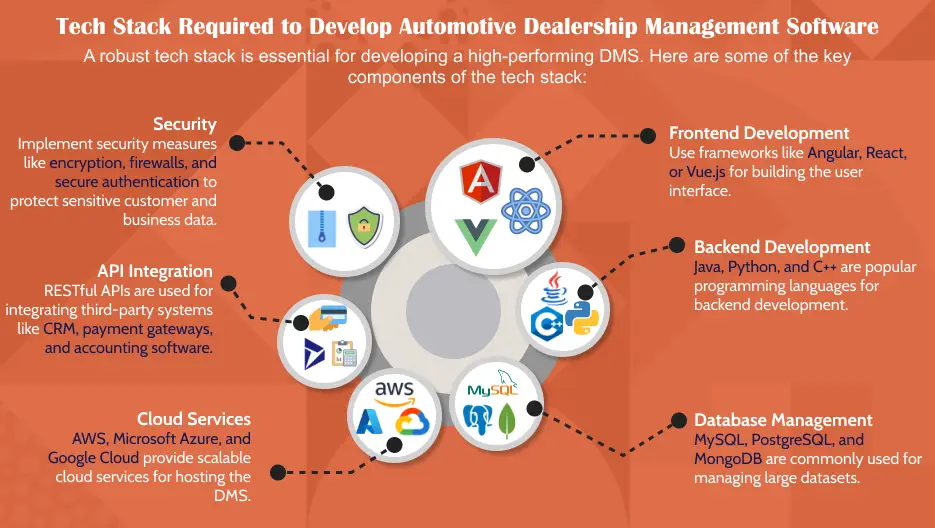Table of Contents
The automotive business has increasingly high competition and today, there are firm facts that define the success of an automotive business: efficiency and customer satisfaction. Automotive dealership management systems are critical in helping them manage their operations and streamline those processes. Automating sales, service management, inventory tracking, customer relationship management, and finance can be both very productive and profitable when a well-built dealership management system is maintained in businesses. Businesses willing to make operational improvements can consider investing in custom- automotive dealership management software development.
In this blog, we are going to cover various aspects of automotive dealership management software development. Including its benefits, key features, cost factors, and required technologies for development.
An Introduction to Car Dealership Management System
A car dealership management system is a central computer application that orchestrates and integrates the tasks in a dealership. It may be inventory management, scheduling test drives, and ensuring flawless customer relationship management, among others. DMS integrates all the departments of a business into one single place, which smoothes workflows and offers real-time tracking of vehicle sales, service appointments, parts inventory, and financial transactions.
Modern DMS software is designed with the object of optimizing efficiency in dealership operations, minimizing the possibility of manual errors, and ultimately delivering improved customer experience. A DMS supports a wide range of dealership operations and lays down the backbone for efficiently running an automotive business.
How Automotive Dealership Management Software Works
An automotive dealership management system integrates various departments and processes within a dealership. The software acts as a unified platform where departments like sales, service, finance, and parts can interact with one another seamlessly. It allows employees to access shared data, such as customer records, vehicle inventory, and service history, from a single source.
For example, a salesperson can use the Car dealership management software to check available vehicles in the inventory, schedule test drives, and access financing options, all within the same system. Service teams can track vehicle repair history, manage spare parts inventory, and schedule vehicle servicing through the same platform.
The software automates many manual processes and provides real-time analytics, which helps dealerships make informed business decisions and improve efficiency.
How an Efficient DMS Software Makes a Difference
Implementing an efficient Car dealership management software brings significant benefits to automotive dealerships. An integrated system improves communication between departments, reduces paperwork, and minimizes errors. Here’s how an efficient DMS makes a difference:
- Streamlined Processes: A DMS automates tasks like sales, inventory tracking, and service scheduling, allowing dealership staff to focus on customer engagement.
- Enhanced Customer Experience: With real-time customer data at hand, dealership staff can provide personalized services, manage customer inquiries, and ensure faster responses.
- Improved Sales and Service: A DMS allows for accurate tracking of sales and service metrics, enabling management to identify opportunities for improvement and optimize operations.
- Data-Driven Decisions: With advanced analytics and reporting tools, DMS helps management make informed decisions based on real-time data, such as sales trends and customer preferences.
Automotive Software Stats and Market Size
The automotive dealership management system market has witnessed tremendous growth in recent years due to the increasing demand for automation in dealership operations. According to market research, the global automotive DMS market was valued at $7.4 billion in 2021 and is expected to reach $11.3 billion by 2032.
Several factors drive this growth:
- Increased demand for efficient vehicle management.
- Rising customer expectations for quick and efficient service.
- Technological advancements such as AI, cloud computing, and IoT make dealership management systems more sophisticated and user-friendly.
- Automotive DMS software has become essential for dealerships looking to improve operational efficiency and customer satisfaction.
Top 5 Automotive DMS Software Available in the Market
CDK Global
CDK Global is one of the largest automotive DMS solution providers, offering a wide range of solutions tailored to meet the needs of dealerships. CDK’s platform integrates sales, service, and inventory management, enabling dealerships to manage all operations from a single interface.
Reynolds and Reynolds
Reynolds and Reynolds offers a cloud-based DMS system designed to improve dealership efficiency. The platform provides tools for sales, service, inventory management, and customer relationship management, making it one of the top choices for dealerships globally.
Dealertrack
Dealertrack is known for its comprehensive suite of dealership management tools. From financing to vehicle sales and inventory tracking, Dealertrack simplifies complex dealership operations.
Autosoft DMS
Autosoft provides cloud-based dealership management software for small and medium-sized automotive businesses. Autosoft’s system offers robust tools for managing sales, service, parts, and accounting operations.
PBS Systems
PBS Systems delivers a flexible and customizable DMS solution. Dealerships can choose from different modules based on their needs, such as service management, CRM, and sales tracking.

Key Components to Consider for Car Dealership Management Software Development
Developing a robust automotive dealership management system requires a comprehensive understanding of the key components that contribute to dealership operations. Below are the core modules to consider during DMS software development.
Vehicle Sales Management Module
- Schedule and Track Showroom Visits: Manage customer showroom visits and track potential buyers’ progress.
- Test Drive Booking and Planning: Schedule test drives and manage vehicle availability for test driving.
- Vehicle Trade-in Management: Manage vehicle trade-ins and calculate the trade-in value for used cars.
- Car Purchase Management: Streamline the car purchase process and ensure seamless transactions between customers and dealerships.
- Vehicle Insurance Management: Integrate insurance management tools into the sales process for customer convenience.
- Vehicle Warranty Management: Handle vehicle warranty claims and manage warranty-related documentation.
- Vehicle Guarantee Management: Manage vehicle guarantees offered to customers and ensure legal compliance.
Vehicle Service Management
- Service Scheduling and Planning: Schedule customer service appointments and allocate resources efficiently.
- Auto Repair Time Management: Track repair times and ensure timely completion of vehicle service.
- Vehicle Warranty Management: Handle vehicle warranties for service-related claims and repairs.
- External Service Management: Manage third-party service providers for external repairs and maintenance.
- Service History Management: Maintain a comprehensive service history for each vehicle.
- Service Document Management: Organize service-related documents for easy retrieval.
- Insurance Financial Management: Handle insurance-related financial transactions for vehicle servicing.
Spare Part Management
- Spare Part Sales Management: Manage the sales of spare parts, both online and in-store.
- Non-stock Item Management: Track non-stock items and manage orders when needed.
- Spare Part Booking: Allow customers to book spare parts for future service appointments.
- Sales Document Management: Store and organize documents related to spare part sales.
- Spare Part Item Substitution: Manage alternative spare part options when primary items are unavailable.
- Barcodes for Spare Part Management: Use barcodes for efficient inventory tracking of spare parts.
- Spare Part Purchase: Automate the purchase of spare parts based on demand forecasts.
Inventory Management
- Parts Inventory Management: Track and manage parts inventory to ensure optimal stock levels.
- Car Lot Management: Manage vehicle inventory across multiple lots and dealerships.
- Spare Part Replenishment: Automate spare part replenishment processes to avoid stockouts.
- Warehouse Management: Optimize warehouse management by tracking stock levels and ensuring proper storage.
- Multi-location Stock Management: Manage inventory across multiple dealership locations and warehouses.
Financial Accounting Module
- Buy-Here-Pay-Here (BHPH): Provide flexible financing options for customers purchasing vehicles from the dealership.
- Retail and POS Operations: Integrate point-of-sale (POS) systems for smooth retail transactions.
HR & Payroll Management
- Employee Information Records: Store and manage employee data, such as personal details and job roles.
- Salaries and Changes: Track salary details and changes for employees.
- Attendance Recording: Manage employee attendance records for payroll calculations.
- Vacation Approval and Tracking: Automate vacation approvals and track vacation days taken by employees.
- Automatic Calculation of Deductions, Overtime, and Salaries: Simplify payroll management with automatic calculations.
- Printing of Pay Slips: Generate and print pay slips for employees.
- Shifts Enabled: Manage employee shifts and allocate resources based on business needs.
- Appraisal System: Implement an appraisal system to assess employee performance.
- Training System: Provide training programs to improve employee skills and performance.
Automotive CRM System
- Contact Management: Manage customer contacts and keep records organized.
- Creating and Capturing Sales: Track sales leads and convert them into customers.
- Operating and Scheduling Sales Calls: Schedule sales calls and follow-ups with potential customers.
- Observing Individual Sales Targets: Track the performance of salespersons and set individual targets.
- Assigning Leads to Salespersons: Distribute leads among the sales team to maximize efficiency.
- Customer Loyalty Management: Manage customer loyalty programs to improve retention.
Workshop Management System
- Customer Reservations: Schedule service appointments for customers and allocate resources.
- Vehicle History Record: Track the service history of vehicles to provide better service.
- Job Order and Status: Manage service job orders and track their progress.
- Real-Time Job Monitoring: Monitor repair times and job completion in real time.
- Workshop Invoicing: Generate invoices for service-related transactions.
- Final Vehicle Inspection and Release Permission: Perform final vehicle inspections before releasing cars to customers.
- Key Service Indicators (KSI) Dashboard: Monitor workshop performance using KSI metrics.
Document Management & Scanning
- Document Input: Digitize physical documents and input them into the system.
- Document Indexing: Organize and index documents for easy retrieval.
- Document Search: Implement advanced search functionality to retrieve documents quickly.
- Document Workflow Automation: Automate workflows related to document management.
- Document Security: Ensure document security with proper access controls and permissions.
- User Dashboards: Provide user-specific dashboards for managing document workflows.
Business Intelligence Analytics
Business Intelligence analytics is essential for a dealership management system. It provides insights into dealership performance, customer behavior, and market trends. BI analytics tools can analyze sales trends, customer feedback, and inventory levels to help businesses make data-driven decisions. For example, dealerships can use BI analytics to forecast demand for specific vehicle models and plan inventory accordingly.
BI tools also help in identifying underperforming departments and provide actionable insights to improve efficiency. With real-time analytics, dealerships can track key performance indicators (KPIs) such as sales conversions, service completion rates, and customer satisfaction.
Reporting Dashboard
A DMS reporting dashboard provides real-time insights into dealership operations. Dealerships can track sales performance, inventory levels, and financial metrics from a unified dashboard. The dashboard offers data visualization tools such as charts, graphs, and tables to make it easier to understand complex data.
Key features of a DMS reporting dashboard include:
- Real-time Sales Reports: Monitor sales performance and track individual sales targets.
- Inventory Reports: Get real-time updates on vehicle and parts inventory.
- Service Reports: Track service job orders, completion rates, and customer satisfaction.
- Financial Reports: Monitor dealership financials such as revenue, expenses, and profitability.
A well-designed reporting dashboard enables dealership management to make data-driven decisions, optimize operations, and increase profitability.

Things to Consider Before Developing Automotive DMS
Before starting the development of automotive dealership management software, there are several important factors to consider:
- On-Site SaaS System: Decide whether you want to implement an on-site system that runs on your internal servers or a cloud-hosted SaaS solution.
- Cloud-Hosted SaaS System: Cloud-hosted systems offer scalability and remote accessibility, making them an ideal choice for growing dealerships.
- Mobile Apps: Consider developing mobile apps to provide dealership staff with access to the DMS while on the go.
- Third-Party Integration: Identify any third-party systems that need to be integrated into the DMS, such as CRM, inventory management, or accounting software.
How to Develop Car DMS Software
There are two main approaches for Automotive dealership management software development:
DMS Software development from Scratch
Building a DMS from scratch offers complete control over the features and functionality of the software. This approach allows businesses to tailor the system to their specific needs. However, developing a custom Car dealership management system from scratch requires a significant investment of time and resources. Development teams typically use programming languages like Java, Python, or C++ to build custom DMS solutions.
Develop DMS Using CMS Platforms
Another approach is to build a DMS using customizable CMS platforms like Magento or Shopify. These platforms provide pre-built modules for managing sales, inventory, and customer relationships. This approach is faster and less expensive than developing a DMS from scratch. However, it may not offer the same level of customization as a fully bespoke solution.
How Much Does It Cost to Develop an Auto Dealership Management System?
The cost for dealership management software development can vary significantly depending on the complexity of the system and the features required. Below is a rough estimate of the cost based on different factors:
| Type of DMS | Cost Estimate | Features |
|---|---|---|
| Basic DMS | $30,000 – $60,000 | Sales management, inventory tracking, CRM |
| Advanced DMS | $60,000 – $150,000 | Business intelligence analytics, workshop management, mobile apps |
| Custom Features | Additional cost based on requirements | Custom features like third-party integrations may increase the development cost |
| Ongoing Maintenance | 10-20% of initial development cost annually | Post-launch support and system maintenance |
How A3Logics Can Help You in Developing Custom DMS Software?
A3Logics specializes in automotive dealership management software development tailored to the unique needs of automotive dealerships. Our team of experienced developers, solution architects, and business analysts work closely with clients to understand their specific requirements. We offer end-to-end services, including consulting, design, development, testing, and post-launch support.
Whether you’re a small dealership looking to automate your operations or a large enterprise seeking to improve efficiency, A3Logics can deliver a scalable, secure, and feature-rich solution. Our expertise in cloud computing, mobile app development, and business intelligence ensures that your DMS software is equipped to handle current and future challenges. Connect with a leading custom software development company to build systems that drive success.







